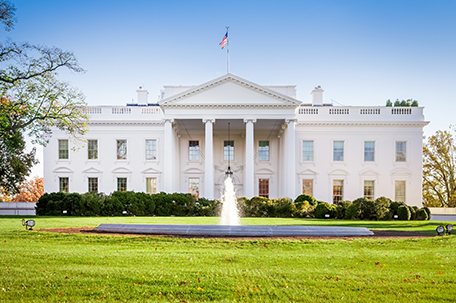
“Six months before an election, the President must establish a White House Transition Coordinating Council, chaired by a senior employee of the Executive Office of the President”
NOTE: Trump or any former president can not illegally stay in office or extend their term after Jan. 20, 2021, noon. The Constitution states a president’s term ends at that time. Secret Service is required to report to and provide full detail protection and security to newly inaugurated president. Outgoing president will no longer have secret service protection, access to necessary codes or data to function as president. International leaders will only correspond with ambassadors appointed by new president. Millitary officials will not take orders from a former president, only current president. If election matters are not resolved by January 20, 2021, the Speaker of the House would serve as acting president. Nancy Pelosi, a Democrat, who is the current speaker will serve as acting President. In other words, the office will leave a former president, even if they wont leave it.
FROM presidentialtransition.org
Introduction
In passing the Presidential Transition Act of 1963, Congress explained: “Any disruption occasioned by the transfer of the executive power could produce results detrimental to the safety and well-being of the United States and its people.” To promote the orderly transfer of power, Congress established a framework for the federal government to prepare for a transition from one president to another.
With strong bipartisan support, the Act has been amended over the years to recognize the increasing complexities of presidential transitions.[1] The law requires the General Services Administration to provide office space and other core support services to presidents-elect and vice Presidents-elect, as well as pre-election space and support to major candidates. The Act also requires the White House and agencies to begin transition planning well before a presidential election, benefitting both first and second term administrations.
What are Agency and Inter-Agency Transition Planning requirements?
The Act establishes an early and organized cadence for the federal government’s transition planning:
- Before the election, each agency must designate a senior career official who will be in charge of transition planning, prepare transition briefing materials, and ensure that succession plans are in place so that as political appointees depart, career officials are prepared to step in place until new political appointees arrive.
- Six months before an election, the President must establish a White House Transition Coordinating Council, chaired by a senior employee of the Executive Office of the President and consisting of other high-level officials, such as cabinet officers; the Directors of the Office of Management and Budget, the Office of Personnel Management, the Office of Government Ethics; the Administrator of GSA; and the Archivist of the United States. A transition representative of the major candidates also sits on the council. The council provides guidance to agencies on transition and facilitates communications between the administration and the transition teams.
- The Act requires a standing Agency Transition Directors Council, co-chaired by GSA’s Federal Transition Coordinator and the Office of Management and Budget’s Deputy Director for Management, and including agency senior career officials responsible for transition activities as well as transition representative of the major candidates. This working-level council works toward an integrated, government-wide approach to transition and ensures that briefing materials are prepared.
What is the Role of the General Services Administration?
The Act requires GSA to provide office space and administrative support (such as information technology and communications capabilities) to a president-elect and vice president-elect and, recognizing a growing need for transition activities to start well before election day, the Act also requires GSA to offer office space and support to major candidates in the months preceding the election, following the political conventions. In the post-election period, GSA is also authorized to pay expenses for staff, experts, postage, and travel for the transition team of the president-elect, if the president-elect is not a president who has been re-elected. Use of government aircraft also may be provided on a reimbursable basis.
GSA also serves a liaison between transition teams and the federal government, helping, for example, to ensure that a president-elect’s “beach-head” team is cleared to enter each agency and be on the job immediately after inauguration of the new president. The law requires the GSA Administrator to designate a senior career official to serve as the Federal Transition Coordinator, who coordinates transition planning across agencies. GSA is also required to compile a report on modern transitions and develop a transition directory with comprehensive information on the officers, organization, and responsibilities of each federal agency. GSA also provides support to help outgoing presidents as they depart the White House.
Also, recognizing that incoming political appointees face unique challenges and requirements coming into federal service, the Act allows GSA to expend funds of training for new appointees during the entire duration of a president’s term, not just during transition or at the beginning of the term. GSA also provides support to help outgoing presidents as they depart the White House.
How does the Act help with transition related to national security?
The Act directs the Federal Bureau of Investigation and other agencies responsible for conducting background investigations to conduct those investigations expeditiously, with the goal of providing appropriate security clearances before inauguration for the individuals that the President-elect has identified for high level national security positions, including secretaries and undersecretaries of cabinet-level agencies. The law also requires that the president-elect be given a classified summary as soon as possible after the election on threats to national security, covert military operations, and pending decisions on possible uses of military force. The White House Transition Coordinating Council is tasked with conducting interagency emergency preparedness and response exercises.
Separately, the Intelligence Reform and Terrorism Prevention Act of 2004[2] allows each eligible candidate, before the election, to submit security clearance requests for prospective transition team members who will need access to classified information. The law directs that background investigations and security clearance determinations for these individuals be completed, to the fullest extent practicable, by the day after the date of the election.
What requirements are placed on recipients of transition assistance?
As a condition of receiving office space and related services, the president-elect and the vice president-elect are required to disclose to GSA all non-federal contributions received for transition activities. The transition teams must also disclose to the public the identities and sources of funding of individuals who enter federal agencies after the election as part of the President-elect’s transition team. Also, GSA, to the greatest extent practicable, must enter memoranda of understanding with each eligible candidate which includes the conditions for the services and facilities provided by GSA, designation of a transition representative to receive inquires related to transition team documents, conditions for access to agencies by the president-elect’s transition team, and agreement by transition teams to implement, enforce and publicly disclose ethics plans for transition team members.
How are presidential transitions funded?
Presidential transitions are funded through a combination of federally appropriated funds and private funds. Congress provided $9.62 million for transition activities in the Consolidated Appropriations Act, 2020, and the President has requested $9.9 million for activities in fiscal year 2021.
To accept private funding, an eligible candidate must establish an entity that is legally separate from the campaign and that qualifies under section 501(c)(4) of the Internal Revenue Code. An eligible candidate may transfer into this entity contributions received for his or her general election campaign and may also solicit and accept donations directly into it. Contributions per person or organization may not exceed $5,000. As noted above, contributions must be disclosed to GSA.
What happens if a President is re-elected?
In the event that the president-elect is the incumbent or where the vice president-elect is the incumbent, federal transition funds for post-election transition activities are returned to the Treasury. The law does allow, though, for GSA to use funds for training of new political appointees throughout a president’s term.
What happens if the result of the election is unclear? The law provides that an eligible candidate has the right to the facilities and services provided to eligible candidates until the date on which the Administrator is able to determine the apparent successful candidates for the office of president and vice president.
Timeline of Requirements
Ongoing
- GSA designates a Federal Transition Coordinator
- GSA develops a transition directory with information on federal agencies
- Agency Transition Directors Council meets (Not less than one meeting per year in off-election years)
- Training for appointees (throughout a president’s term)
12 months before election
- GSA produces report summarizing modern transition activities and relevant resources
6 months before election
- President establishes a White House Transition Coordinating Council
- Agency Transition Directors Council begins to meet on a regular basis
- Each agency designates a senior career employee to oversee transition activities
- The Federal Transition Coordinator reports to the Senate Committee on Homeland Security and Governmental Affairs and the House Committee on Oversight and Reform on transition preparations
Post-Conventions through Election
- 3 months before the election, the Federal Transition Coordinator reports to the Senate Committee on Homeland Security and Governmental Affairs and the House Committee on Oversight and Reform on transition preparations
- Not later than September 1, GSA enters memorandums of understanding with eligible candidates regarding support services
- Not later than September 15, heads of agencies ensure succession plans are in place for non-career positions
- Not later than October 1, GSA negotiates memorandums of understanding with transition teams, including agreement by transition teams to implement and make public their ethics plans
- Not later than November 1, the Agency Transition Directors Council ensures that transition briefing materials are prepared
Post-Election (if there is a change in administration)
- On the day following the election, GSA begins to provide office space and support services to the president-elect and Vice President-elect, with support continuing up to 60 days after inauguration
- A classified summary regarding national security is given to the president-elect as soon as possible after the election
- 30 days before the expiration of the term, GSA begins support to outgoing president and vice president, with support continuing for 7 months total
















Leave a Comment